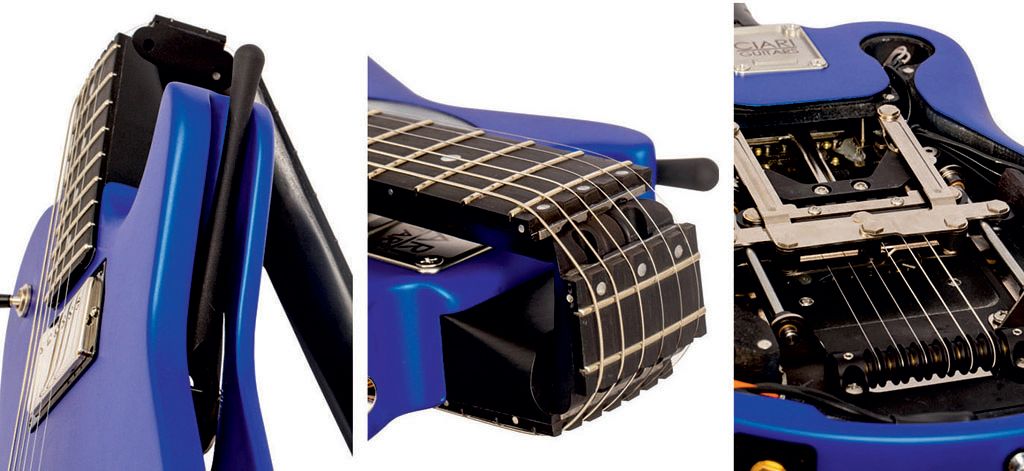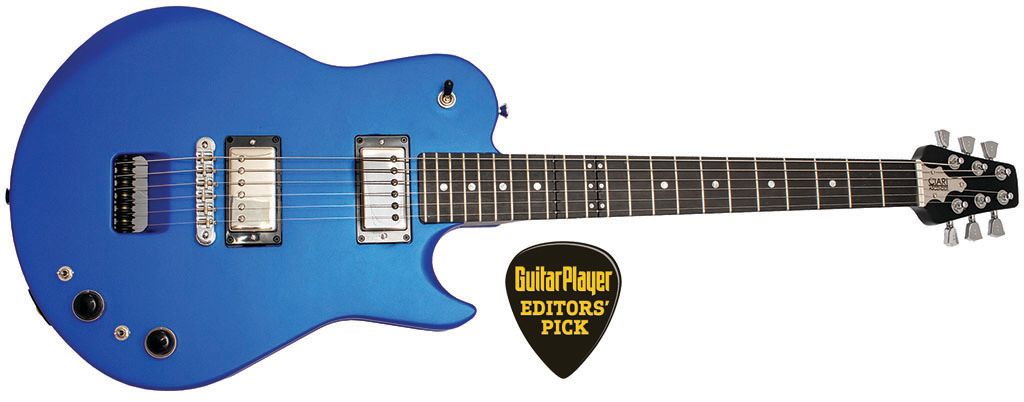GuitarPlayer Verdict
The fact that the guitar folds up is a plus, but just as important, it played and sounded as good as many high-quality instruments you would have to check through baggage at your own risk.
Pros
- +
Well-designed and constructed.
- +
Inspiring to play.
- +
Born to wander.
Cons
- -
May not be ideal for some string benders.
You can trust Guitar Player.
The Ascender is the project of Jonathan Spangler, an aspiring musician who was also chief patent counsel for a medical device manufacturer. Spangler’s day job kept him on the road, so he wanted to bring a guitar with him for practicing in hotel rooms.
When he was unable to find a full-sized, gig-ready instrument that could fold to fit under a plane seat, he was inspired to launch Ciari Guitars and helm the development of the Ascender, a travel guitar that fully satisfies the CEO’s original spec.
The key to the Ascender’s flexibility is a lever concealed within the body’s perimeter. Flipping it drops the string tension from 118 pounds to a mere three, at which point a patented mechanism allows the guitar to be folded symmetrically in half.
Adjacent to each hinge joint in the fingerboard are shallow V-grooves for the strings. Three pounds of tension is just enough to rest the strings within the grooves as the neck folds without damaging them, and a bar across the nut holds them in place there.
When you’re ready to play, simply unfold the guitar and rotate the lever back to its concealed location to return the strings to playing tension. A see-through plate on the guitar’s back lets you view the precision mechanism that makes all of this possible.

I found folding and unfolding the Ascender as easy as advertised. It takes only a minute to figure out the best way to hold it so that the strings remain in place when folding, as well as the best position for exerting the necessary pressure to lock it back into place. Each time I unfolded it, the guitar popped right back, with minimal retuning required.
The Ascender’s modern C-shaped neck was perfect for my hand, and the Pleked frets made for buzz-free playing and easy bending, with one caveat: When attempting classic bends in my usual style over the V-grooves, I found the flesh of my finger would sometimes briefly hang up in a groove. This wasn’t an issue if I bent the bending finger so it was more perpendicular to the fretboard.
All the latest guitar news, interviews, lessons, reviews, deals and more, direct to your inbox!
For this reason, I might not recommend the Ciari to a blues guitarist, but there are many guitar styles, from be-bop to alt-pop, that don’t require string bending, and for those players the Ascender should be a pleasure to play.
Overall, there is no sense of compromise here. The fact that the guitar folds up is a plus, but just as important, it played and sounded as good as many high-quality instruments you would have to check through baggage at your own risk.
The Ascender is fitted with a pair of Seymour Duncan ’59 pickups, each with volume and tone controls, a coil tap and a three-way toggle. In humbucker mode, the Duncan ’59s easily drove my 20-watt 3rd Power Clean Sink and 12-watt Supro Comet combos into glorious breakup, while the tapped single-coil settings were warm and not too thin.
Guitar companies have been making travel guitars for a long time, but the Ascender is the first one I could happily use on a professional stage as a backup guitar or even as a main instrument. The elephant in the room is, of course, the price. Still, if you are flying frequently for business or pleasure, you are unlikely to be earning minimum wage.
When you factor in the cost of full-sized instruments lost or broken by airlines, early boarding fees to get your guitar safely stowed, and the fact that a quality instrument will inspire you to practice more and longer than a cheaper travel guitar, the price starts to seem very reasonable. For its excellent execution of a practical solution, the Ciari Ascender earns an Editors’ Pick Award.
Specifications
CONTACT ciariguitars.com
PRICE $2,999 and up, depending upon finish and wood
NUT WIDTH 1.7"
NECK Mahogany
FRETBOARD Ebony or pau ferro
FRETS 22 medium jumbo
TUNERS Graph Tech Ratio Locking Tuners
BODY Basswood or alder
BRIDGE Tune-o-matic Roller Bridge
PICKUPS Seymour Duncan ’59s
CONTROLS Volume and tone controls, three-way selector and a coil-tap switch for each pickup
FACTORY STRINGS Fender Bullets .010–.046
WEIGHT 8.5 lbs
BUILT USA
KUDOS Well-designed and constructed. Inspiring to play. Born to wander
CONCERNS May not be ideal for some string benders

